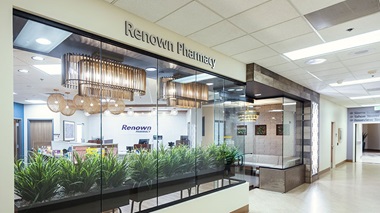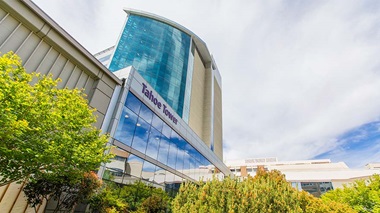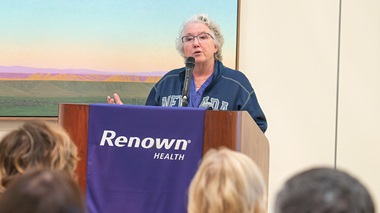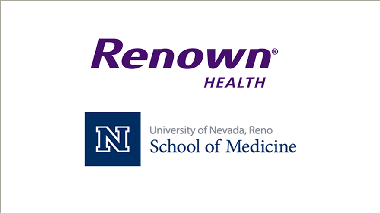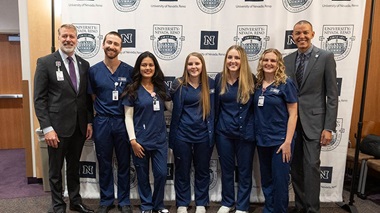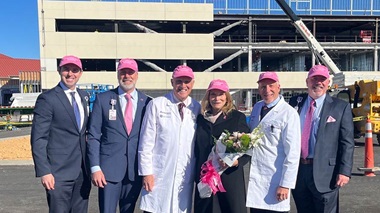Featured News
Careers
Awards & Accreditations
University of Nevada, Reno
Renown Health Foundation
Media Resources

Renown Health's public relations team supports media partners in finding experts on diverse health care topics. In addition, we provide information and answer all questions regarding Renown. We look forward to working with you.
-
Media On Campus
For patient confidentiality purposes, Renown Health policies require media to be escorted by the public relations staff at all times.
PR staff will gladly make parking arrangements, notify the appropriate hospital staff and help you find your destination.
Stand Ups/Live Broadcasts
Media may conduct stand ups and live broadcasts on our campuses. In the interest of patient confidentiality and traffic flow, a staff member will help you find the best location for your story.
We ask you to respect our obligation to protect our patients' well-being and legal right to privacy.
-
Patient Condition Inquiry
We follow regulations of the Health Insurance Portability and Accountability Act of 1996 (HIPAA) for all patients, including patients of public interest. HIPAA regulations specify which information may and may not be released without authorization from a patient.
Patient privacy regulations allow us to only share patient condition information about patients that appear in our directory.
Media inquiries require correct spelling of the patient's first and last name.
Definitions of "Condition" used by Renown Health
When describing a patient's condition, we can only release the following patient statuses:
Good - Vital signs such as pulse, temperature and blood pressure are stable and within normal limits. Patient is conscious, comfortable and there are no complications.
Fair - Vital signs are stable and within normal limits. Patient is conscious and alert although may be uncomfortable or in pain and may have minor complications.
Serious - Vital signs may be unstable or outside normal limits. The patient is acutely ill or injured and may have major complications.
Critical - Vital signs are unstable or outside normal limits. There are major complications.
Note: "Stable" is not a condition.
Press Releases
-
Research Shows Genetic Approaches to Breast Cancer Screenings Yield More Accurate Results
Clinical researchers with the Healthy Nevada Project co-author research paper with findings that emphasize the need for a comprehensive approach to breast cancer risk assessment – including a focus on genetic medicine – to help ensure that individuals at high risk are identified and supported proactively rather than reactively. Breast cancer is a leading cause of cancer death among women in the United States. According to the American Cancer Society, about 1 in 8 women will develop breast cancer and about 1 in 39 women will die from breast cancer. Breast cancer is associated with increased age, hereditary factors, obesity, and alcohol use. Since 1990, breast cancer death rates have declined progressively due to advancements in treatment and detection. In Nevada there are an estimated 2,310 new breast cancer cases a year, and genetic mutations such as in the genes BRCA1 or BRCA2 remain a top risk factor for this prevalent disease. Recognizing the urgency for progress in breast cancer research, a collaborative effort between physicians, advanced practice providers and scientists from the Healthy Nevada Project® (HNP) and Helix have unveiled groundbreaking research. This study explores how genetic screenings are a necessary supplement to traditional testing methods, together offering more accurate insights into a patient's likelihood of developing breast cancer in the future. HNP is operated by Renown Genomic Medicine and the Institute for Health Innovation and is one of the largest community-based population health studies in the country. Their team works in collaboration with Helix, a leader in precision health that delivers comprehensive genomic solutions. Together, this dynamic partnership aims to understand breast cancer risk factors and pave the way for more effective preventative measures. The combined research team studied 25,591 female HNP participants to evaluate the performance of different genetic screening approaches to identify women at high risk of breast cancer. The results of this research suggest that a combined monogenic, or single-gene, and polygenic, or multi-gene, approach to breast cancer screenings helped produce more accurate results and more closely identify study participants who have a high genetic risk of developing the disease. "Based on this research, we are advocating a shift in approach which would improve breast cancer risk assessment through a combination of effective family history ascertainment and genetic screening,” said Joseph Grzymski, PhD, principal investigator of the Healthy Nevada Project, research professor at the University of Nevada, Reno School of Medicine and co-author of the breast cancer research paper. “This tailored approach, founded on the assessment of individual genetic risk, not only intends to elevate patient well-being but also will improve efficiency and equity in healthcare." Complementing the team’s research on leveraging genetics to identify women at low genetic risk of breast cancer that could safely defer mammogram screenings by five to 10 years that was released in late 2023 in JAMA Oncology, the study suggests that incorporating genetic information can assist in personalizing breast cancer screenings and optimizing the use of screening resources. "Existing disparities persist across various facets of breast cancer screening and treatment; however, genetic screening is clearly a powerful tool to help facilitate early intervention for those at higher risk,” said Jamie Schnell Blitstein, APRN, a primary care nurse practitioner at Renown Health and co-author of the breast cancer research paper. “By placing a heightened focus on risk, we underscore the pivotal role of preventative breast cancer screening.” Despite the availability of effective methods for early screening, co-authors of this research found that 78 percent of women with a family history of breast cancer had their risk ascertained only after a breast cancer diagnosis. The findings emphasize the need for a comprehensive approach to breast cancer risk assessment – including a focus on genetic medicine – to help ensure that individuals at high risk are identified and supported proactively rather than reactively. “These findings that can profoundly impact how healthcare is delivered were only made possible by all the participants who were willing to consent to research,” said Alex Bolze, PhD from Helix and co-author of the publication. “Broad-scale collaboration projects like these between Renown Health and UNR that engage large populations where participants share both their genetic information as well as electronic health records drive advancements in preventative medicine, as well as fundamental biological research.” The research paper was officially accepted on Jan. 29, 2024, and will be published by Elsevier, Inc. on behalf of the American College of Medical Genetics and Genomics. The contents of the paper will appear in the international journal Genetics in Medicine Open. Read the full article by visiting sciencedirect.com. The Healthy Nevada Project is currently recruiting new study participants. Free to all Nevadans with a saliva sample or blood draw, participants and their referring providers receive access to whole-exome sequencing and clinical grade results that help provide insight into their unique genetic risks tied to heart disease and certain cancers. If you are interested in enrolling in the study, schedule a Virtual Consent Appointment through MyChart or contact the Renown Institute for Health Innovation at RenownIHI@renown.org or (775) 982-6914 to be connected to a Genomic Representative. About Renown Health Renown Health is the region’s largest, not-for-profit integrated healthcare network serving Nevada, Lake Tahoe and northeast California. With a diverse workforce of more than 7,000 employees, Renown has fostered a longstanding culture of excellence, determination and innovation. The organization comprises a trauma center, two acute care hospitals, a children’s hospital, a rehabilitation hospital, a medical group and urgent care network, and the region’s largest, locally owned not-for-profit insurance company, Hometown Health. Renown is currently enrolling participants in the largest community-based genetic population health study, the Healthy Nevada Project®. To join the Renown Health team, visit renown.org/careers. About Helix Helix is the leading population genomics and viral surveillance company operating at the intersection of clinical care, research, and data analytics. Helix enables health systems, life sciences companies, payers, and government partners to accelerate the integration of genomic data into patient care and public health decision-making. Learn more at helix.com.
-
Renown Health In-House Lab Now Processing COVID-19 Tests for Patients and Care Providers
Expanded test processing capabilities is resulting in faster test results, lessening the load on the state lab, and helping keep patients, care providers and the community safe. Renown Health announced today that its in-house laboratory is now able to process up to 500 COVID-19 tests for hospital patients and care providers each day. The organization has invested in expanded test processing capabilities to better serve the community amid the coronavirus pandemic, and to increase testing available across the state. Next month, Renown anticipates continuing to further expand testing capacity and doubling its capacity to be able to provide 1,000 tests per day in preparation for the continued response to the pandemic. “The COVID-19 pandemic is not going away- it is still with us. I am concerned by the number of new cases and hospitalizations we are seeing across northern Nevada. We must do more testing. We need broader capabilities around making sure we have broad-scale surge testing available, so we can help people identify if they have COVID-19 or not,” said Tony Slonim, MD, DrPH, Renown’s President & CEO. “If I could test 60,000 people in northern Nevada for COVID-19, like we did for the Healthy Nevada Project, we could better understand with data and facts the proportion of people who actually have COVID-19 versus those that just have the sniffles and a cold.” Launched in 2016, the Healthy Nevada Project https://healthynv.org/ is a community-based population study where free genetic testing is provided to thousands of Nevadans to learn about the health of the community and each person’s genetic risks. As of Tuesday, 2,286 people in northern Nevada have been tested, and positive cases were nearing 700. Seventy four people in northern Nevada have died; 1,526 have recovered. https://www.washoecounty.us/ Dr. Slonim says it would help him and others make important decisions and plans for coronavirus with evidence. He wants to be able to test many more individuals across northern Nevada. “Testing is pivotal upstream, so you can prevent consequences downstream,” said Dawn D. Ahner, DSc, FACHE, Chief Operating Officer – Renown Acute Services. “By processing our own tests, we’ve reduced the turnaround to receive results to just 12-24 hours, which will have a profoundly positive impact on our community, and lightens the load on the State lab. “Testing is an incredibly important tool in our fight against coronavirus,” said Tim Stephens, vice president of ancillary services. “There's no 100% perfect test, however, the PCR tests are so incredibly sensitive, that when done perfectly, have a very low false-positive rate. Certified labs like Renown’s use a number of procedures to reduce the risk of false test results.” “The expansion of our lab’s new testing capabilities during this time is a testament to the innovative and important work being done here at Renown,” said Erik Olson, CEO of Renown Regional Medical Center. “Throughout the pandemic, our ancillary team, which includes services like laboratory, radiology and pharmacy, has been quick to adapt to the needs of our patients and our community. I am pleased that we are able to generate critical test results for patients and providers as we continue the fight against COVID-19 and go the extra mile for safety.” Going the extra mile for safety As an added safety measure, acute hospital patients; patients preparing for surgery, and care providers who may have come into contact with those positive for COVID-19, are among those that receive mandatory PCR testing from Renown at this time. For patients receiving hospital care, these tests help determine if patients should be placed in a designated area of the hospital to mitigate the risk of transmission to those not infected. Furthermore, all surgery patients are tested ahead of their surgery and self-quarantine prior to their surgical procedure at Renown Regional Medical Center and Renown South Meadows Medical Center. How do PCR tests work? PCR tests use a sample of mucus typically taken from a person's nose or throat. The test looks for the genetic material of the coronavirus, using a technology called PCR to detect if the viral genetic material is present. Those actively infected with the virus will show the existence of that material. Individuals who think they should be tested for COVID-19 are encouraged to call their medical provider or contact the Washoe County Health District at 775-328-2427 for a risk assessment. For up-to-date information on Renown’s approach to keeping our community safe, visit our website at renown.org/covid-19/. Please see b-roll for this story here. About Renown Health Renown Health is a locally governed and locally owned, not-for-profit integrated healthcare network serving northern Nevada, Lake Tahoe and northeast California. Renown is one of the region’s largest private employers with a workforce of more than 7,000. It comprises three acute care hospitals, Renown Children’s Hospital, Renown Rehabilitation Hospital, the area’s most comprehensive medical group and urgent care network, and the region’s largest and only locally owned not-for-profit insurance company, Hometown Health. Renown has a long tradition and commitment to continually improve the care and the health of our community. For more information, visit renown.org.

